The International Urban and Regional Cooperation (IURC) Asia & Australasia programme held its second thematic session on 23 September, gathering 51 participants from 10 regions across Europe, Korea, Australia, and New Zealand. The focus was on regional cooperation in clean energy and the blue economy, with regions presenting concrete strategies for hydrogen ecosystems, offshore wind, geothermal, waste-heat recovery, solar innovation, and zero-emission transitions. Participants shared their progress and challenges in the various sectors, while the team introduced the relevant EU smart specialization thematic communities and next steps in this IURC phase.
Highlights from the Regions
- Taranaki (New Zealand): Matt Lamb presented Taranaki’s strategy to shift from traditional industries toward a diversified economy. The “Branching Out” project supports new agri-innovation and tourism models, while investments in green hydrogen aim to secure Taranaki’s place in the global clean energy market. The region seeks to build resilience for its workforce through re-skilling and long-term sustainable growth.
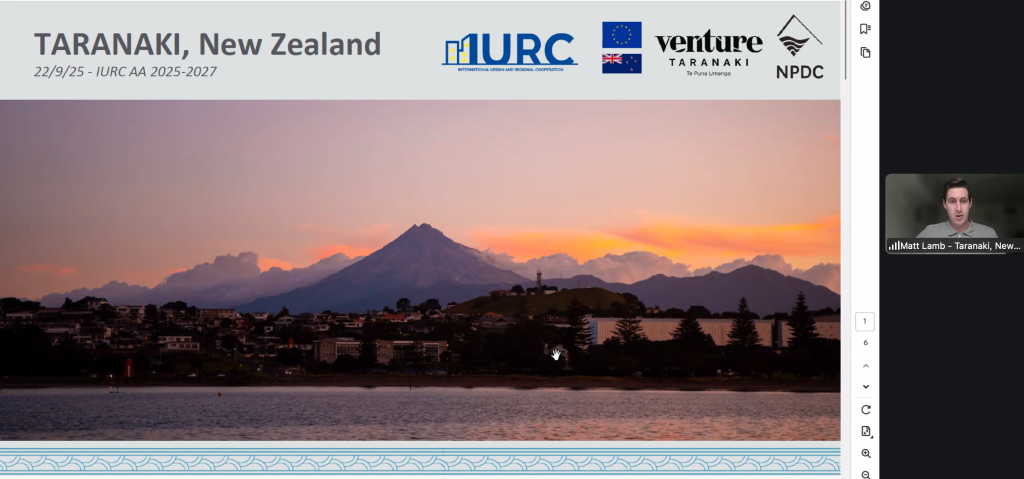
- Bremen (Germany): Julia Diers outlined Bremen’s leading role in the Blue Economy and Clean Energy, highlighting the ECOMAT Research and Technology Center, offshore wind capacity in Bremerhaven, and innovative port decarbonisation projects. The region also hosts one of Germany’s most advanced hydrogen hubs. Dr. Stephanie Baasch will support further exchanges on Bremen’s approach, which links aerospace, automotive, and maritime industries to the green transition.
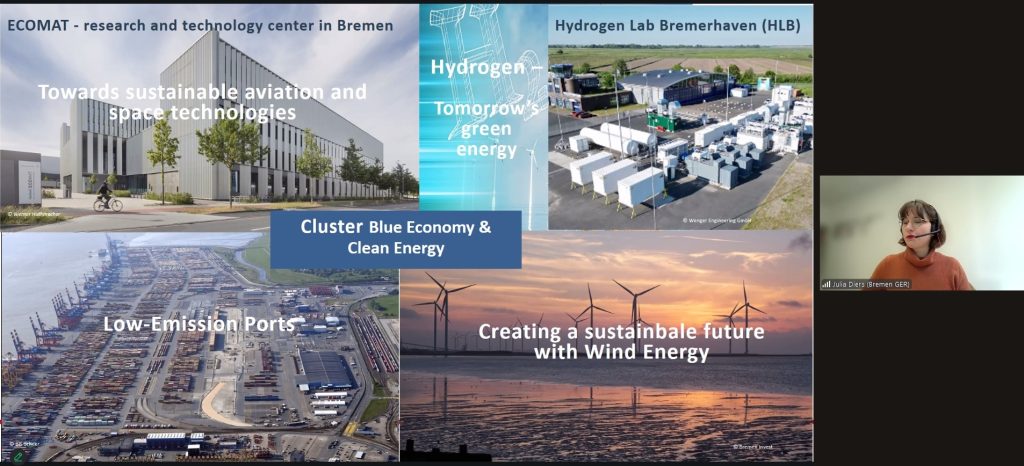
- Hobart (Australia): Jessica Robbins described Hobart’s ambition to achieve net zero by 2040. Despite Tasmania’s official net-zero status, the city faces challenges in reducing actual emissions, particularly from transport. Energy efficiency upgrades in public buildings already save over €1 million annually, but Hobart is seeking innovative financing and partnerships to accelerate uptake of renewables and zero-emission vehicles across its 200,000-strong community.

- Île-de-France (France): Cédric Guillon-Lavocat presented the region’s leadership in hydrogen technology and cleantech development. During the 2024 Olympic Games, hydrogen taxis showcased the region’s innovation capacity. Additional work focuses on geothermal energy, waste-heat recovery, and advanced technologies such as semiconductors and quantum computing. Île-de-France faces challenges in ensuring stable long-term policy support but remains committed to strengthening its hydrogen ecosystem.
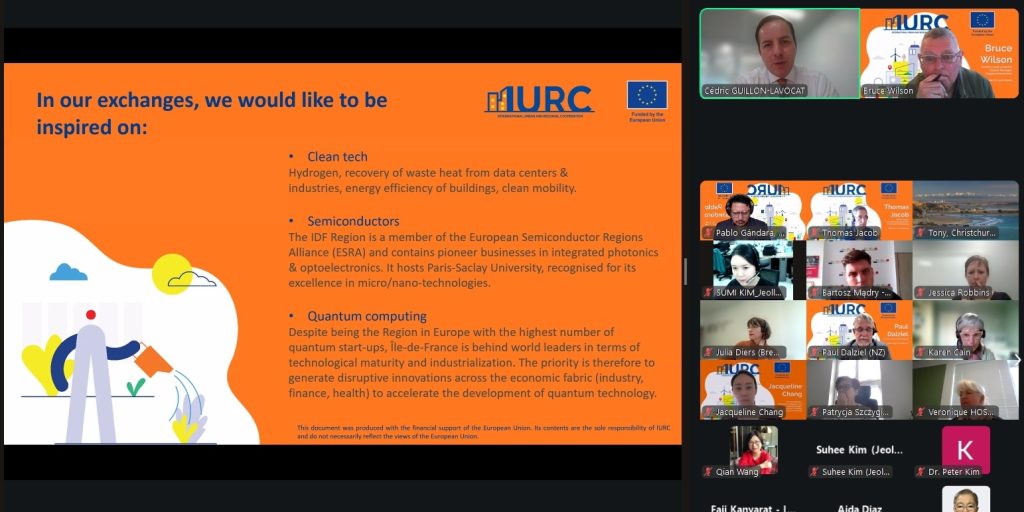
- Lodzkie (Poland): Bartosz Mądry detailed the transition away from the Bełchatów coal plant—the largest in Europe—toward a diversified low-carbon mix. Plans include small modular nuclear reactors, solar, wind, bioenergy, and geothermal pilots. The Lodz Special Economic Zone plays a central role as an innovation hub, bringing together government, business, and academia in a triple-helix approach to re-train workers and stimulate regional economic growth.
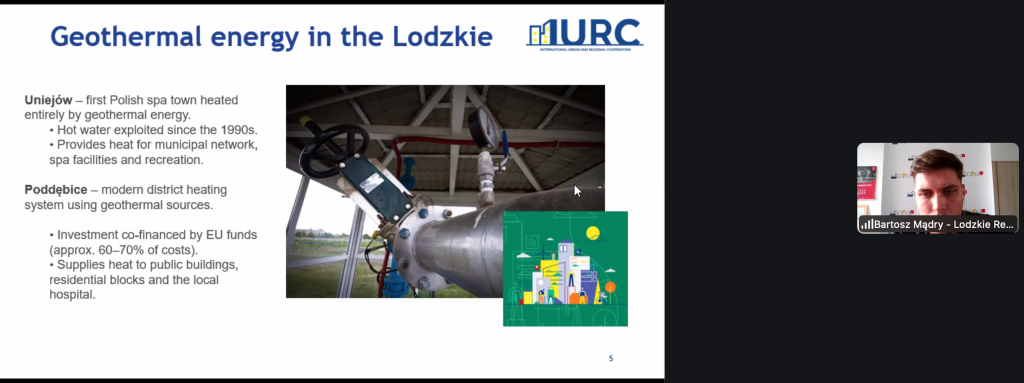
- Jeju (Republic of Korea): Kwang-Yong Seo showcased Jeju’s ambition to achieve carbon neutrality by 2035. Already the region with Korea’s highest renewable share, Jeju is building a green hydrogen ecosystem supported by smart infrastructure and policy innovation. The island invited IURC partners to the annual Green Hydrogen Global Forum to explore collaboration in island energy transitions and scalable solutions for developing countries.
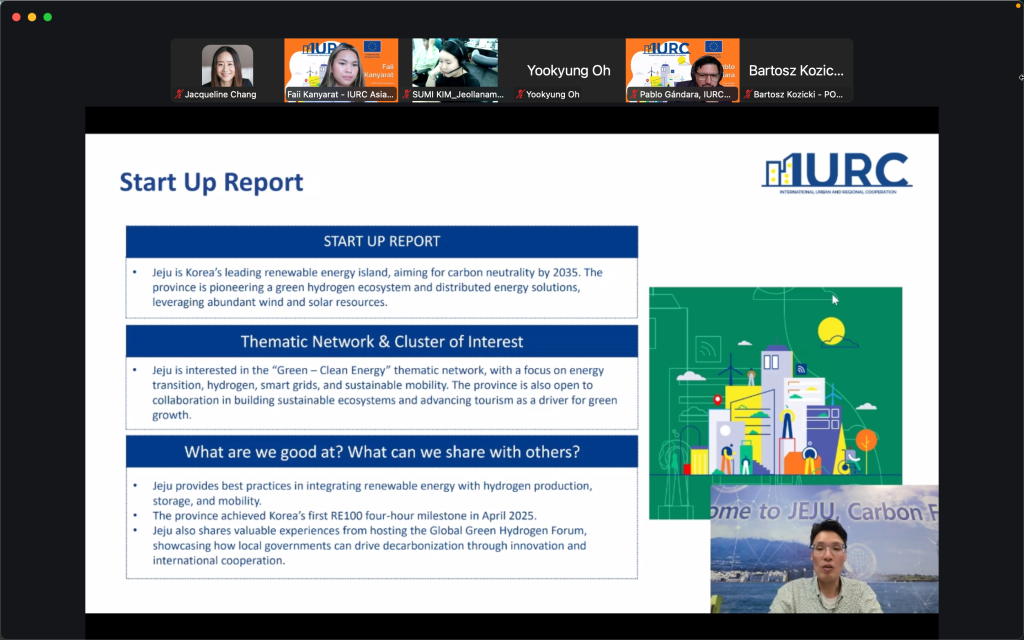
- Jeollanam-do (Republic of Korea): Sumi Kim presented Jeollanam-do’s energy transition strategy, anchored in offshore wind and solar power. The province has set a goal of 30GW offshore wind capacity by 2035. Innovative projects include the Shinan Solar Pension, which redistributes solar revenues to local communities—up to USD 3,800 annually per resident. With 16,000 residents already benefitting, Jeollanam demonstrates how renewable energy can deliver both environmental and social dividends.
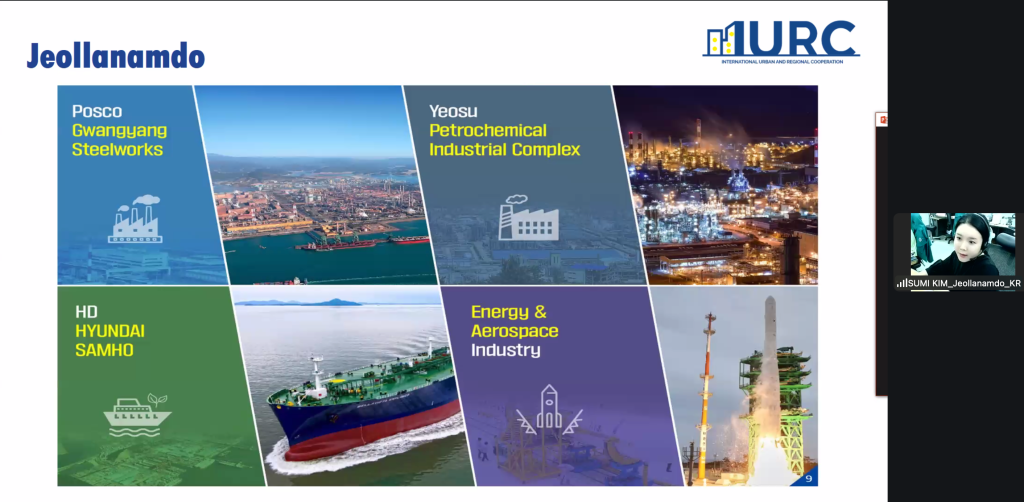
- Pomerania (Poland): Patrycja Szczygieł underlined Pomerania’s ambition to position itself as a clean energy hub. Plans include offshore wind development, new nuclear capacity, and a strong focus on cohesion policy funding and regional research agendas. The region is eager to exchange knowledge with global partners on innovative financing and green industrial transitions.
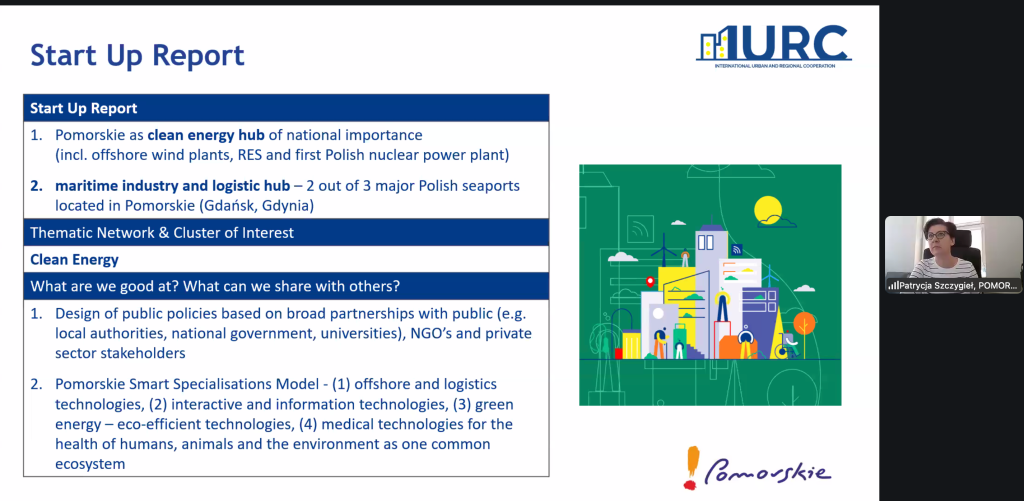
- Climatorium (Denmark): Sarah Lund described the Climatorium’s role as a non-profit centre for climate dialogue and applied solutions, with a special focus on water. Ongoing projects include pyrolysis to treat wastewater sludge, nature-based solutions for flood and pollution control, and youth engagement in climate innovation. Climatorium has a track record of successful cooperation with New Zealand from the first IURC phase.
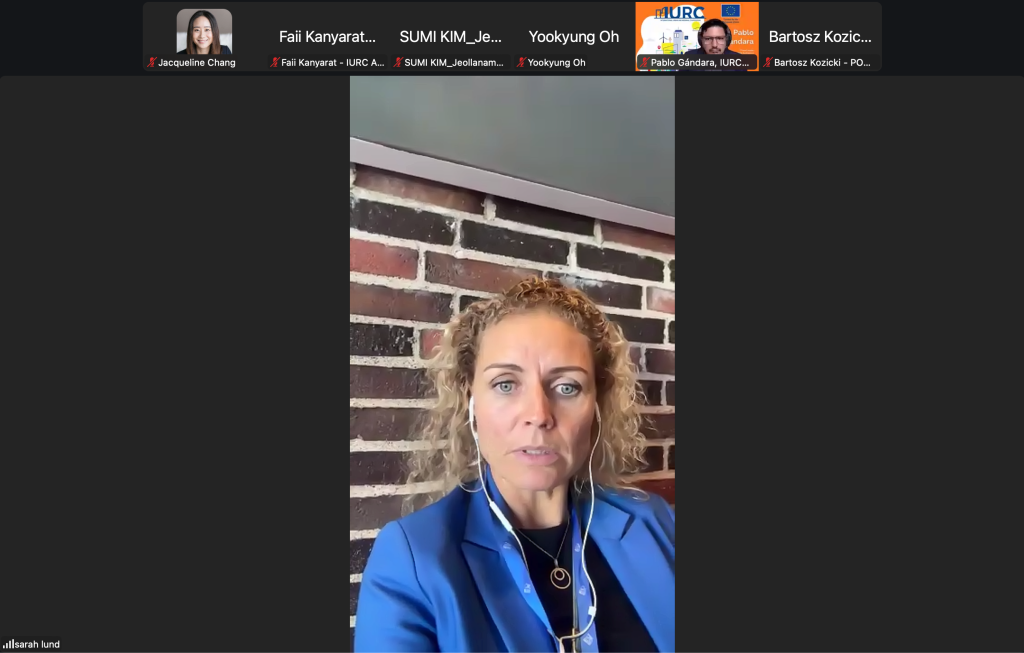
- Gippsland (Australia): Christian Stefani raised questions on the integration of offshore wind energy into regional energy systems. Gippsland is developing new partnership models involving government, industry, and research institutions to accelerate offshore wind deployment. The region is particularly interested in learning from EU and Korean approaches to port infrastructure and industrial symbiosis.
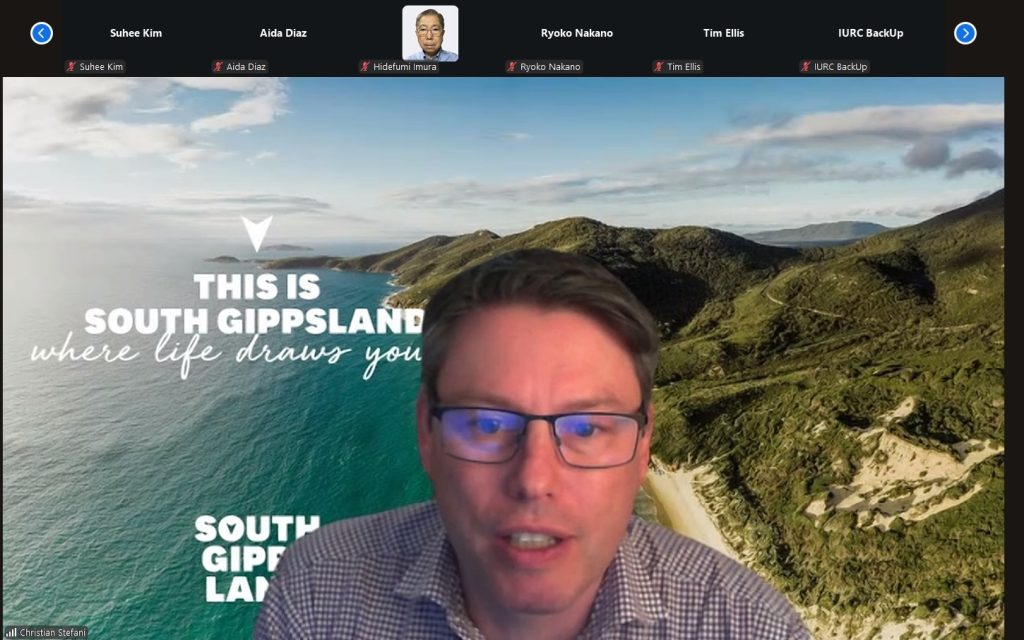
Building Cooperation
The discussion highlighted a new MoU between Taranaki and Vilnius, supporting joint research on biogas and renewable energy. Participants agreed on the need to move from broad discussions to concrete pilot projects, with deep-dives proposed for hydrogen corridors, offshore wind logistics, geothermal deployment, and innovative finance models.
Next Steps
- Presentations from six more regions are scheduled for 1 October 2025.
- Thematic deep-dive sessions will start on 7 October 2025.
- An in-person networking opportunity will take place at the IURC event in Barcelona, November 2025.
Cities and regions are asked to confirm their delegate nominations by 30 September 2025.
